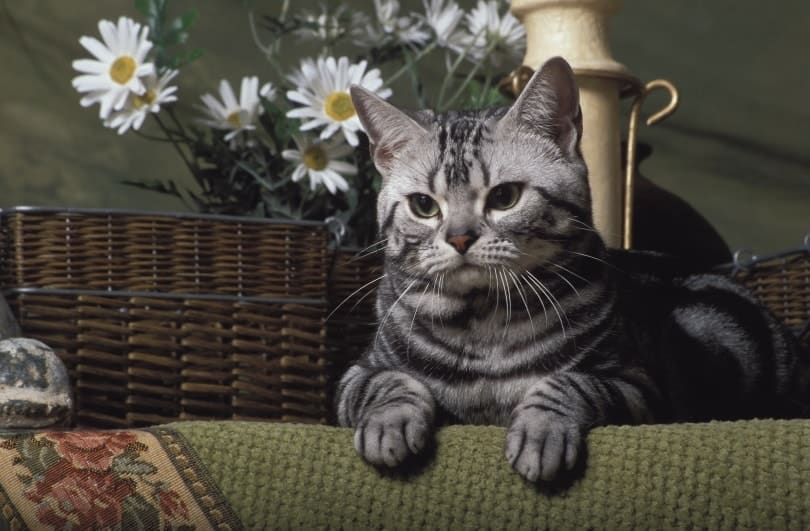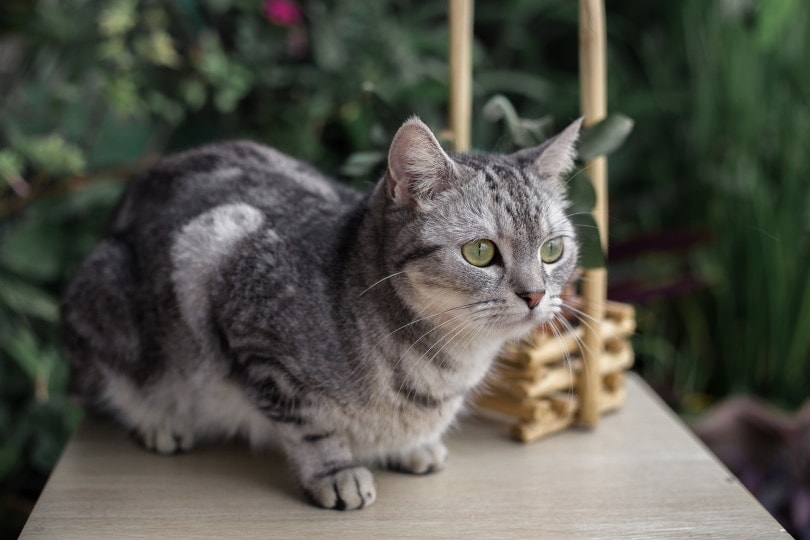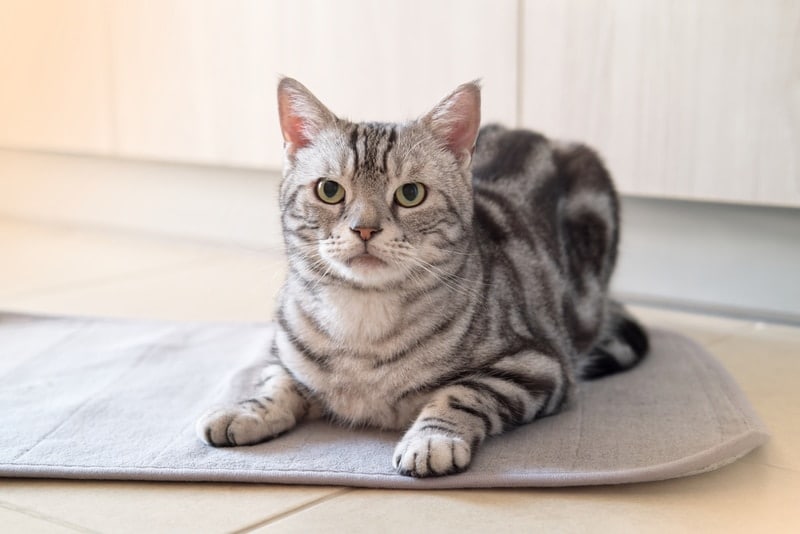While cats don’t display the radical size differences that you’ll see among dogs, some do grow bigger than others. When you’re deciding which breed is right for you, size could be a factor to consider.
Bigger cats typically consume more food. Medications and preventative products are also dosed by weight, which costs more for larger kitties. Essentially, the size of your cat will play a role in your monthly pet budget.
In this article, we discuss one of the most popular purebred breeds, the American Shorthair. You’ll learn how big these cats can get and the factors that impact their growth.
American Shorthair Cat Overview
The ancestors of the modern American Shorthair breed are believed to have arrived on the same ships as European settlers. These sturdy, friendly cats controlled the rodent population onboard and in the new settlements. American Shorthairs were developed along with the country of their name, eventually taking part in the first cat shows in the late 19th century.
American Shorthairs remain excellent hunters. They’re also calm, adaptable cats that make lovely family pets. They’re athletic but easy-going and grow very attached to their humans.
They are typically healthy, low-maintenance cats that don’t require much grooming. Their short coats come in nearly all known colors, with tabby patterns being the most common. This breed has a long life expectancy, regularly living to be at least 15 years old.
American Shorthairs usually get along with other pets and enjoy playing with children. They are intelligent and can be trained easily but can get into mischief if they don’t receive enough mental stimulation.
Provide your American Shorthair with various toys, and spend time playing with them each day. This breed is consistently one of the most popular in the world, in no small part because of how people-oriented they are.

American Shorthair Cat Size and Growth Chart
American Shorthairs are considered medium-sized cats. Several factors can impact an American Shorthair cat’s growth. The following chart represents an estimated size and growth chart by age for the average American Shorthair cat. Because a kitten’s length and height vary so much, it’s difficult to produce an accurate growth chart, so these estimates are very loose. When tracking your kitten’s growth, weight is a more accurate measure.
| Age | Weight Range | Length Range |
| 3 months | 2–4 pounds | 6–8 inches |
| 4 months | 4–5.5 pounds | 7–9 inches |
| 5 months | 5–6 pounds | 8–10 inches |
| 6 months | 5.5–6.6 pounds | 9–11 inches |
| 9 months | 6.75–8.75 pounds | 10–13 inches |
| 1 year | 6–9 pounds | 12–15 inches |
| 3 years | 6–15 pounds | 12–15 inches |
When Does an American Shorthair Cat Stop Growing?
American Shorthair cats don’t develop as quickly as other breeds. The average cat achieves full size in about 12–18 months. American Shorthairs may continue to fill out until they’re 3 or even 4 years old. The fastest growth will occur during the first year of life. After a year, you’ll need to monitor your American Shorthair’s weight gain carefully to ensure they stay at a healthy size.

Factors Affecting the Size of an American Shorthair Cat
The biggest factor influencing the size of an American Shorthair cat is whether they’re male or female. Male American Shorthairs are typically bigger than females, sometimes by quite a bit. Genetics will also play a role. An American Shorthair will generally reach the average size of their parents. Nutrition, especially early in life, also influences a cat’s adult size.
Because so much growth occurs in the first months of life, an inadequate diet can result in a smaller cat. Inherited medical issues and the mother cat’s health are also factors that affect the size of an American Shorthair Cat.
Ideal Diet for Maintaining a Healthy Weight
Generally, American Shorthair cats should eat a diet formulated for kittens until about 1 year old. Talk to your veterinarian about when to change to an adult diet based on your cat’s growth.
Adult American Shorthairs should eat quality, nutritionally balanced cat food. Your vet can help you calculate how many calories your cat should eat daily based on their size, sex, weight, and activity level. If you feed your American Shorthair cat treats, factor these calories into their daily total.

How to Measure Your American Shorthair Cat
To determine the length of your American Shorthair Cat, start at the front of the shoulder, and measure to the base of the tail. Tail length is not included in the dimensions of a cat. If you want to measure their height, go from the withers (top of the shoulder) down to their feet.
Weighing your cat at the vet’s office or on a baby scale is usually the most accurate. However, you can weigh yourself alone and then hold your cat while standing on the scale. Subtract the difference to determine your cat’s weight.
Conclusion
American Shorthair cats display some variation in size, especially between males and females. While they are considered a medium-sized breed, American Shorthairs present a solid silhouette thanks to their rectangular body shape and large head. They can easily become overweight, especially as their growth slows, so keep a close eye on how much they eat. The size of American Shorthair cats makes them sturdy enough to serve as playmates for kids, which is just one reason this breed is so beloved worldwide.
See Also:
Featured Image Credit: Apisit Hrpp, Shutterstock











